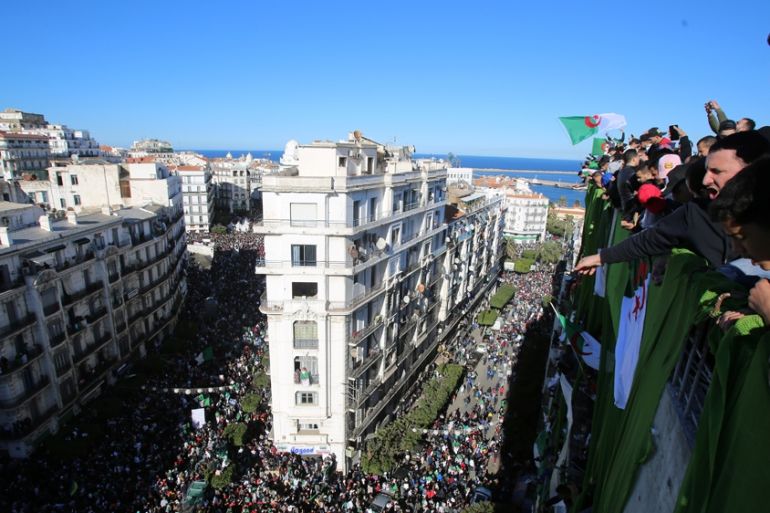Algeria: New opposition umbrella group fails to reach consensus
The National Coordination for Change laid out plans for a transition, but received mixed reactions from protesters.

Algiers, Algeria – As tens of thousands of Algerians filled the streets for the fifth week in a row on Friday in an effort to push President Abdelaziz Bouteflika from power, leading opposition figures began working on collectively shaping the country’s political transition.
Echoing demands of the street, the National Coordination for Change (CNC), an emerging bi-partisan umbrella group, that ranges in membership from socialist to Islamist activists, has rejected Bouteflika’s plan to extend his 20-year rule, while overseeing Algeria‘s political transition.
This newly-formed group issued a statement on Monday titled the “platform of change” in which it urged Bouteflika to hand over power to a temporary collective presidency on April 28, the day on which his fourth term expires.
In the statement, the CNC also called for the dissolution of parliament and asked the military not to interfere in politics.
“The army and the security services should carry their constitutional duties without interfering in the political choices of the people,” it wrote.
“It is today urgent and necessary to make radical changes of the system in place, based on new foundations and new leaders.”
Mistrust among ‘signatories’
The initiative raises many questions as it remains unclear who launched it.
According to the statement, the “platform is the result of weeks-long meetings between Algerians coming from cities and villages across the country, who are concerned by the future of Algeria.”
When contacted by Al Jazeera, however, the CNC declined to comment on the identity of the group’s members, while some alleged signatories of the statement distanced themselves from the CNC.
Mustapha Bouchachi, a prominent lawyer and human rights defender, denied joining the group. “I have never signed this platform,” Bouchachi told Al Jazeera.
Likewise, Zoubida Assoul, a lawyer and leader of the Union for Change and Progress, a small political party, also said that she did not sign up to the platform. “I received the document and responded that I agreed on the substance with the platform but I have never decided to join any such coalition,” Assoul told Al Jazeera.
For Samir Bouakir, former spokesperson of Algeria’s socialist party (FFS), the creation of an independent coalition to oversee the transition is “premature”.
“I signed the platform [statement], but I won’t join the CNC. First, Bouteflika administration must leave. Only then we can discuss the creation of institutions, which will oversee the political transition,” Bouakir told Al Jazeera.
The initiative was not positively received by many street protesters, who questioned the participation of two Islamist activists.
The two signatories, Mourad Dhina and Kamel Guemazi, are former high-ranking members of the banned Islamic Salvation Front (FIS) – the Islamist party whose cancelled legislative election victory in 1991 led to a decade-long civil war.
“Their signatures at the bottom of the Platform discredits this initiative,” said a member of Mouwatana, a group of opposition figures, including political leaders and human rights activists, who called for the boycott of the presidential election.
“I will never collaborate with people who have blood on their hands and are responsible for the Black Decade,” Cherifa Kheddar, head of Djazairouna, or Our Algeria, an association for victims of attacks, and a feminist activist, told Al Jazeera.
But Dhina, who lives in exile in Geneva and has been accused by the Algerian authorities of belonging to a terrorist cell in Switzerland, rejects the allegation.
“There is no proof behind this accusation. I joined the FIS shortly after the 1992 military coup. But I have never been involved in any violent or criminal activities,” Dhina told Al Jazeera.
The cofounder of the exiled opposition movement Rachad said that he has “no political ambition”.
“This is a non-partisan approach. The Platform is a synthesis reuniting people’s ideas for a transition. I am not the initiator neither the mastermind of the CNC,” he explained.
Still, many protesters describe the initiative as an attempt by former Islamist activists to return to Algeria’s political arena.
“It is a strategy by banned FIS’ members to play a role in the transition. They are using the leaderless movement for their own agenda,” a member of Mouwatana, who wished to remain anonymous, told Al Jazeera.
|
|